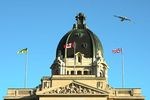There will be another balanced budget in Saskatchewan in 2013-14.
However, there is no abundance of goodies associated with this year's budget, with funding increases not going up perhaps as much as some entities - such as universities - would like.
Finance minister Ken Krawetz brought down the 2013-14 budget in the legislature Wednesday afternoon.
Revenue was projected at $11.61 billion, a 2.7 per cent increase, while expenses were estimated at $11.54 billion, for a "modest" 3.1 per cent increase. The General Revenue Fund projected a $64.8 million pre-transfer surplus, while a surplus of $149.8 million is forecast in the Summary Financial Statements taking into account all government operations including Crown corporations.
"Our plan for growth is built on a foundation of balanced budgets and fiscal responsibility," Krawetz said in a conference call with reporters.
Krawetz acknowledged the government needed to control spending due to declining resource revenues.
"To get there we needed to make some choices. This may mean some groups in our province will have a little smaller increase than they had hoped for. Sometimes decisions have to be delayed. Our government remains committed to reducing business tax, but that reduction will not start this year. It will start when it is affordable, sustainable and within a balanced budget."
Krawetz also said the tobacco tax and liquor markups would be going up at midnight on budget night. The tobacco tax rate is increased by 4.0 cents per cigarette, with a comparable increase on cut/loose tobacco. Liquor taxes go up by about 3.0 per cent for all beverage categories, effective April 1.
The Growth and Financial Security Fund is forecast to end the year with a balance of $695.1 million. A change highlighted by Krawetz this year is the decision for the fund to allocate $512.7 million for "security" to address unforeseen events outside of the government's control, and will allocate funds of $182.4 million towards "growth" to address future infrastructure projects and debt reduction.
Krawetz also told reporters Premier Brad Wall has directed that for now the money in this fund will not be allocated to any specific projects until the impact of the potential flooding this spring is known.
He said the budget was balanced in both the general revenue fund as well as in the summary financial statement. Krawetz also called the budget balanced in terms of the need to control spending as well as the need to make investments in key areas.
Krawetz highlighted the support the budget offers to the most vulnerable people in the province, with increased support benefits to low-income seniors under the Seniors' Income Plan, and for persons with disabilities under the Saskatchewan Assured Income for Disability program. He noted the government was doubling capital funding for para-transit buses and increased transit funding for persons with disabilities.
Krawetz also pledged to address domestic violence by increasing funding for women's shelters, expanding facilities in Regina and Prince Albert, and opening in Melfort the first new transition house in Saskatchewan since 1989.
In the infrastructure budget, the government is to invest $847.5 million in infrastructure projects this year, an increase of $59.8 million or 7.6 per cent from last year.
Krawetz told reporters the capital budget includes key investments in schools, health care facilities including hospitals and long term care facilities, post secondary institutions, roads, highways and municipal infrastructure. He called maintaining and improving infrastructure "one of the challenges of a growing province, and our budget meets that challenge."
Krawetz also pledged to address labour force development - ensuring Saskatchewan has "a highly-skilled, well-trained workforce to meet the needs of a growing economy."
"We know affordability of post-secondary education is an issue for students," Krawetz said. "That's why this budget increases direct student support funding by nearly $20 million or 20 per cent, to $117.4 million."
This includes increases of $63.9 million for the Graduate Retention Program, an increase of $12.2 million; $34.5 million for the Student Aid Fund; $7.5 million for the Saskatchewan Advantage Scholarship, an increase of $2.9 million; and $6.5 million in new investment for the Saskatchewan Advantage Grant for Education.
The 2013-14 budget also includes increases of 300 additional apprenticeship training seats, industry-driven skills training, immigrant settlement support programming and Adult Basic Education, the Provincial Training Allowance, First Nations and Métis skills training programs like Northern Career Quest and the Aircraft Maintenance Engineer Training Program at Saskatchewan Indian Institute of Technologies.
Other budget highlights Krawetz pointed to included shortening wait times, more affordable housing, funding for K to 12, improving educational and employment opportunities for First Nations and Métis peoples, and other areas.
As for projects impacting on Northwest Saskatchewan, there was mention of Saskatchewan Hospital in the budget - but in respect to it being a possible P3 opportunity.
For 2013-14, SaskBuilds is being provided $6.0 million to begin preparatory work on a number of P3 opportunities, with the Saskatchewan Hospital North Battleford specifically mentioned in the budget as one of those opportunities.
There was no mention of a further 2013 funding commitment towards construction, however, although $50 million is being committed towards building a new Moose Jaw Union Hospital.
"This budget not only balances the books, it balances the priorities of Saskatchewan people," Krawetz said. "It controls spending while making key investments. It promotes opportunity while ensuring we protect those in our province who need help. It ensures Saskatchewan will continue to grow while meeting the challenges of that growth. And it keeps Saskatchewan moving forward."




